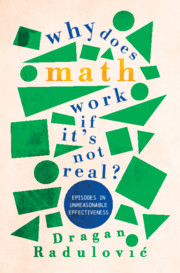Book contents
- Why Does Math Work … If It’s Not Real?
- Why Does Math Work … If It’s Not Real?
- Copyright page
- Dedication
- Contents
- Preface
- Acknowledgments
- Part I Rare Axioms
- Intermezzo
- 4 On Computer Games
- 5 On Mathematical Logic
- 6 On Postulates and Axioms
- Part II The Oracle
- Epilogue: The Eternal Blueprint
- Post Scriptum: On Mathematical Grand Design
- Appendix
- Recommended Reading
- Index
5 - On Mathematical Logic
from Intermezzo
Published online by Cambridge University Press: 12 April 2023
- Why Does Math Work … If It’s Not Real?
- Why Does Math Work … If It’s Not Real?
- Copyright page
- Dedication
- Contents
- Preface
- Acknowledgments
- Part I Rare Axioms
- Intermezzo
- 4 On Computer Games
- 5 On Mathematical Logic
- 6 On Postulates and Axioms
- Part II The Oracle
- Epilogue: The Eternal Blueprint
- Post Scriptum: On Mathematical Grand Design
- Appendix
- Recommended Reading
- Index
Summary
The previous chapter raised the issue of consistency, which has its own place within the world of mathematics, in particular mathematical logic. The next four chapters talk about the ways mathematicians struggled with issues very similar to the ones computer game developers do: Are their games (theories) consistent or maybe there is an inherent contradiction (bug) lurking behind the scene? We tackle the problems of The Fifth Axiom, The Axiom of Choice, Measure Theory, and Russell’s Paradox. As before, these chapters can be read independently, but put together, they offer a plausible answer to our mystery introduced in the first two chapters.
- Type
- Chapter
- Information
- Why Does Math Work … If It's Not Real?Episodes in Unreasonable Effectiveness, pp. 61 - 75Publisher: Cambridge University PressPrint publication year: 2023

